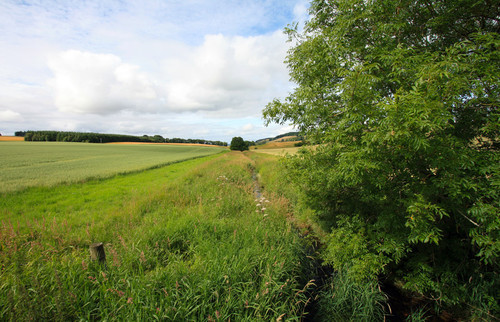Preventing water pollution from farm discharges to water
Preventing water pollution, wastewater management on farms
 Organic matter such as milk, food, crops, dirty water, silage effluent and slurry is highly polluting to watercourses. The bacteria that is already present in water uses organic matter to multiply and at the same time it removes oxygen from the water. Without oxygen the fish and small insect life in watercourses cannot survive. One litre of milk is as damaging to a river as 40 litres of raw sewage.
Organic matter such as milk, food, crops, dirty water, silage effluent and slurry is highly polluting to watercourses. The bacteria that is already present in water uses organic matter to multiply and at the same time it removes oxygen from the water. Without oxygen the fish and small insect life in watercourses cannot survive. One litre of milk is as damaging to a river as 40 litres of raw sewage.
If you let ammonia from slurry or manure run-off get into watercourses it can poison the fish and insects living there.
Substances such as oil, pesticides, sheep dip, fertilisers and silt can all pollute watercourses. If you allow any polluting matter to enter surface waters or groundwater, you may be committing a pollution offence.
What you must do
Ensure that contaminated drainage does not enter watercourses, surface water drains, land drains or groundwater. If you allow any polluting matter to enter surface waters or groundwater, you may be committing a pollution offence.
If you discharge any sewage effluent, trade effluent or contaminated run-off to surface waters or groundwater you must first have:
- in Northern Ireland, a discharge consent, groundwater authorisation or pollution prevention and control (PPC) permit
- in Scotland, an authorisation under the Controlled Activity Regulations (CAR) or a pollution prevention and control (PPC) permit.
GPP 1 General guide to the prevention of pollution (Adobe PDF – 95.8KB)
If you discharge any effluents to a public sewer you must have either a trade effluent consent or have entered into a 'trade effluent agreement' with your sewerage company.
- Trade effluent - discharges to sewers
- Water UK: Contact your water company
- Scotland on Tap: Water and sewerage providers in Scotland
You must not let effluent from cleaning and disinfecting animal housing enter soakaways, surface water drains or watercourses. You should dispose of washwaters by mixing them with slurry and spreading them onto land. If you need to dispose of unusually large volumes or concentrations of disinfectant then you may need prior written authorisation from your environmental regulator.
Contact your environmental regulator
Dairy washwater that contains animal excreta is defined as 'slurry'. You must therefore ensure that you store this washwater using the same precautions as you would use when storing slurry.
Scotland
If you keep livestock in Scotland then you must prevent significant poaching of any land that is within 5 metres of any surface water or wetland.
Prevent livestock from entering land that is within 5 metres of any well, spring or borehole that supplies water for human consumption.
You must not position livestock feeders within 10 metres of any surface water or wetland.
Runoff from land where livestock gather round feeders or water points must not enter any spring, borehole, wetland or surface water. Buffer zones or other measures must be in place.
Farming and Water: Keeping livestock
Good practice
Design animal housing to minimise the area that could be contaminated with slurry. This will reduce the amount of slurry you have to deal with. If you roof-over your yards you could reduce contaminated run-off.
Divert uncontaminated water, for example roof water, away from dirty areas. Only clean water can be discharged directly to watercourses or soakaways.
Store waste plant debris such as cuttings and rotten fruit in areas with contained drainage to prevent contamination of watercourses.
Further information
The codes of good agricultural practice provide more information on how to prevent water pollution.
In Northern Ireland, see section 4.1 of the DARD code of good practice for water, air and soil.
DAERA: Code of good agricultural practice for the prevention of pollution of water, air and soil
In Scotland, see section 4.30 of the Prevention of Environmental Pollution from Agricultural Activity (PEPFAA) Code.
Information on preventing water pollution from farms is available from the Farming and Water Scotland website.
SEE ALSO: Cross compliance and agri-environment schemes
